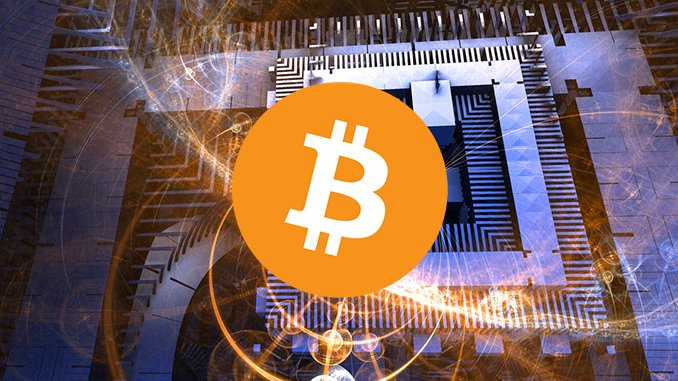
A strong argument for Bitcoin (BTC) is tamper resistance. However, discussions flare up again and again as to whether quantum computers will be able to break the encryption in BTC’s network in the future. Now the year 2022 is making the rounds.
Scare tactics or urgently needed warning? The topic of quantum computers is keeping the technically interested parts of the cryptoscene immensely busy, and reports from the USA are once again attracting attention. In short, it is a question of when so-called quantum computers will reach the performance level required to override the encryption standards that have been in use up to now in the block chains of Bitcoin (BTC) and other crypto currencies. In autumn 2019 Google presented its self-developed quantum computer. This computer seems to be far from endangering the security of BTC. However, experts such as those from the company Post-Quantum, which specialises in cryptograms, say that it is not necessary to look at Google’s supercomputer and similar private sector projects. The danger to the integrity of Bitcoin comes from secretly promoted quantum computers on the part of the state.
Background on BTC, encryption and quantum computers
In simple terms, quantum computers no longer solve tasks assigned to them in the familiar binary system of 0 and 1, but combine this information into quantum bits (qubit). Although this results in a small error rate, the computing power increases exponentially. Google’s quantum computer achieves about 54 qubits of power and experts agree that at least 4,000 qubits would be needed to crack the BTC code. This certainty in the calculation is thus derived from the SHA-256 and ECDSA (Elliptical Curve Digital Signature Algorithm) standards used when creating new blocks and public keys for Bitcoin.
A quantum computer could, with the appropriate performance, crack this encryption by reversing the calculation process and calculating the private key from the public key at BTC. This would enable access to wallets. In addition, a quantum computer as a miner at Bitcoin could take control of the block chain in a virtual snap, since it finds new blocks faster than all other network participants. For investors in Bitcoin this is of course a horror scenario; the converted theoretical value of all Bitcoin currently amounts to far more than 150 billion US dollars. If their security is no longer guaranteed by cryptography, the price would probably drop to zero in a flash.
Google believes that the moment will come between 2025 and 2030 when the encryption used up to now will become useless. Other experts emphasize that quantum computers are optimized for a specific task and that cracking the Bitcoin code is not necessarily the main focus.
But there are also other voices. Andersen Cheng, CEO of Post-Quantum, can be quoted on Twitter as follows The really working quantum computers are not announced publicly, “because whoever has one becomes the master of the universe”.
"The first working quantum computer…will not be announced, because whoever has got it will become the master of the universe." Post-Quantum’s Andersen Cheng spoke to @computerworlduk to provide his big quantum computing predictions for 2020.https://t.co/hnRBXDhQfq
— Post-Quantum (@post_quantum) January 30, 2020
In striking terms, Cheng means that such a breakthrough in the development of quantum computers will make it possible to read encrypted messages or infiltrate strictly secured computer networks with ease. Cheng also suggests elsewhere that work on the next generation of quantum computers has already progressed further than known in NATO and intelligence programmes.
One indication that the challenge of creating new encryption standards is being taken seriously is the efforts of the National Institute of Standards and Technology (NIST). The US authority is already organizing conferences under the title “PQC (Post-Quantum Cryptography) Standardization” and contributions show where science stands. There, the potential problem is not only dealt with in an abstract way, but solutions are sought.
From this perspective, it is also possible to understand why the cryptoscene is not panicking over quantum computers. On the one hand, greats such as Ethereum inventor Vitalik Buterin or Leemon Baird of Hedera Hashgraph point to historical experiences: With updates in the code, blockchains can be protected even before danger from superior computer systems threatens. And secondly, secret services would probably have no interest in focusing their capacities on Bitcoin. The sums of money circulating there are far too small for that, and the secret of a superlative quantum computer too valuable.
Conclusion: Quantum computers remain a theoretical problem for Bitcoin for the time being
So, to sum up: The encryption technology of Bitcoin (BTC) and many other crypto currencies is not absolutely future-proof and should therefore be further developed through updates. But until quantum computers in private hands pose a threat, there is enough time for this. Whether research on quantum computers in China, Russia or the USA on behalf of the government is further than known? It sounds like conspiracy theory, but cannot be ruled out. However, such projects would probably have other goals than Bitcoin. Nevertheless, it will not be the last time that crypto investors are warned of the danger posed by quantum computers to their deposits. Because under the buzzword “quantum computer”, scenarios and solutions can be sold, here interest groups can easily generate attention.
Best place to buy Bitcoin:

Leave a Reply